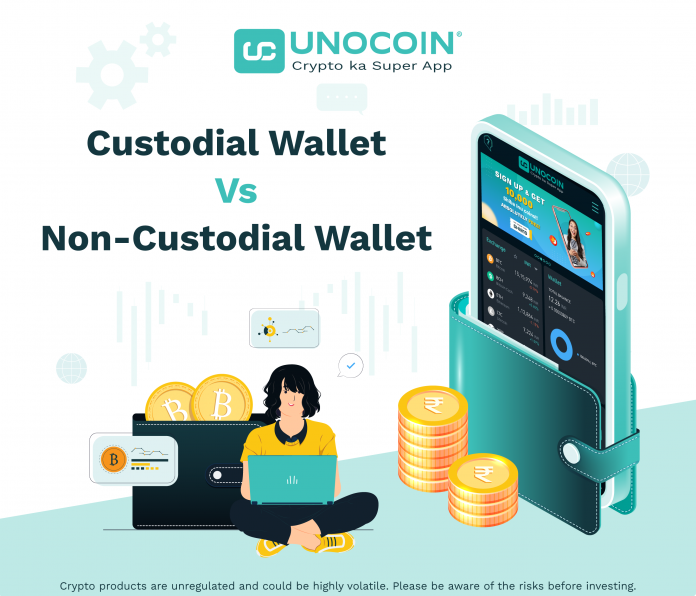Understanding the Differences Between Custodial and Non-Custodial Cryptocurrency Wallets
A cryptocurrency wallet is a digital wallet that allows users to store, send and receive digital assets such as Bitcoin or Ethereum. There are two main types of cryptocurrency wallets: Custodial and non-custodial.
Escrow wallets are wallets held by a third party, such as an exchange or company. Examples of escrow wallets include Coinbase and Binance. These types of wallets are easy to use and convenient because users don’t have to worry about managing their own private keys. However, they also bring certain risks. If the third party holding the wallet is hacked or goes bankrupt, users may lose access to their funds. Additionally, escrow wallets may not offer as much control over a user’s assets as a third party may be able to freeze or seize funds.
On the other hand, non-custodial wallets are wallets where the user holds their own private keys. For example hardware wallets such as Trezor and Ledger and software wallets such as MyEtherWallet. Custodial wallets offer users more control over their assets as they have full access to their private keys. This means they can manage their own funds and transactions without the need for a third party. However, these wallets also bring some risks. If a user loses their private keys, they lose access to their resources. Additionally, non-tethered wallets can be more difficult to use for those unfamiliar with the technology.
Exploring the Pros and Cons of Custodial and Non-Custodial Wallets
Overall, both custodial and non-custodial wallets have their own set of pros and cons, and the choice between the two will depend on the user’s specific needs and preferences. custodial wallets are more convenient to use but have less control over assets, and non-custodial wallets offer more control over assets but may be more difficult to use for some users.
Custodial wallets are a popular choice for beginners and those who want the convenience of currency exchange. These types of wallets are easy to use and allow users to transact quickly and easily. For example, if you want to buy bitcoins, you can simply link your bank account or credit card to an exchange like Unocoin or Binance and make the purchase. The exchange will then hold your bitcoin in an escrow wallet until you are ready to send it to another wallet or make another transaction.
Non-Custodial wallets are a popular choice for those who want more control over their assets and want to keep them offline. Hardware wallets such as Trezor and Ledger are popular examples. These wallets store the user’s private keys on a physical device such as a USB drive that is not connected to the Internet. This means that the user’s funds are safe from hacking attempts. Moreover, hardware wallets are easy to use and have a user-friendly interface.
Another example of a non-custodial wallet is a software wallet like MyEtherWallet that stores private keys on the user’s computer or mobile device. This type of wallet is also easy to use and offers more control over assets, but there is also a risk of being hacked if the user’s device is compromised.
Bottom Line:
In conclusion, whether you choose a Custodial or non-Custodial wallet depends on your own specific needs and preferences. Custodial wallets are more convenient and offer less control over assets, while non-custodial wallets offer more control over assets, but may be more difficult for some users to use. Both types of wallets have their advantages and disadvantages. Before making a decision, it is important to carefully consider your options and understand the risks associated with each type of wallet. In addition, it is also important to ensure that you use a reputable and secure wallet provider, as well as take appropriate measures to protect your private keys and assets.
Please find the list of authentic Unocoin accounts for all your queries below:
- YouTube Channel: https://www.youtube.com/c/Unocoin/videos
- Newsletter: https://medium.com/subscribe/@Unocoin_growth
- Blogs: https://blog.unocoin.com
- Instagram: https://www.instagram.com/unocoin/
- Twitter: https://twitter.com/Unocoin
- Facebook: https://www.facebook.com/unocoin/
- LinkedIn: https://in.linkedin.com/company/unocoin
- Telegram Group: https://t.me/Unocoin_Group
- Telegram Channel: https://t.me/+fasQhTKBsfA5N2Zl
- Telegram: https://t.me/UnocoinSupport_Bot
- E-mail id: [email protected]
- Contact details: 7788978910 (09:30 AM IST – 06:30 PM, Mon – Sat)
- App store link: https://apps.apple.com/us/app/unocoin/id1030422972?ls=1
- Playstore link: https://play.google.com/store/apps/details?id=com.unocoin.unocoinwallet
Disclaimer: Crypto products are unregulated as of this date in India. They could be highly volatile. At Unocoin, we understand that there is a need to protect consumer interests as this form of trading and investment has risks that consumers may not be aware of. To ensure that consumers who deal in crypto products are not misled, they are advised to DYOR (Do Your Own Research).




![Fundamental Analysis in Crypto [Updated Guide] A Comprehensive Guide to Asset Valuation.png](https://blog.unocoin.com/wp-content/uploads/2024/11/A-Comprehensive-Guide-to-Asset-Valuation-218x150.png)